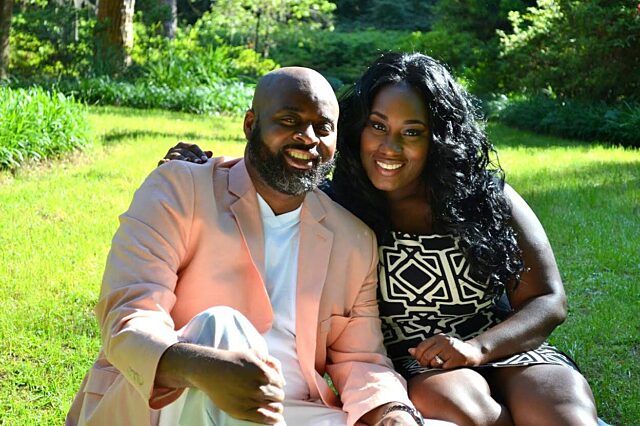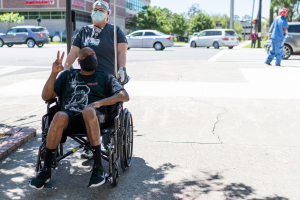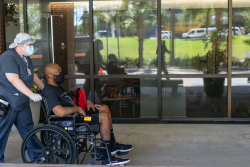He survived a heart transplant, a kidney transplant and, along with his family, COVID-19

Enell “Trent” Porter had long battled hereditary congestive heart failure and diabetes, at times falling critically ill. But the 50-year-old had a new shot at life, as long as his body accepted his new heart, transplanted at UF Health Shands Hospital on Feb. 28, and a new kidney, transplanted the next day.
After recovering from these complicated surgeries, the Tallahassee man was discharged and went to recuperate in the Gainesville apartment where he was staying with his wife, Irish, and their 5-year-old son Caleb.
The couple, owners of a home health care agency, had been following the news as the novel coronavirus emerged in Florida. The threat still felt far away as the state’s earliest confirmed cases, announced March 1, were in Hillsborough and Manatee counties.
Trouble began two to three weeks later when Porter’s wife and son both developed fevers. Over the next several days, Irish Porter, 37, would test positive for COVID-19, the disease caused by the coronavirus. She began her quarantine and recovery at the Gainesville apartment with Caleb. Although he had COVID-19 symptoms, Caleb was not tested.
Porter developed a cough and runny nose — symptoms so mild at first he thought they were seasonal allergies. But his nasal swab test for COVID-19, performed because of his wife’s symptoms, also came back positive. In less than a week, he spiraled into severe respiratory distress, needing a lifesaving ventilator and medically induced coma to protect his fragile new organs.
His wife remembers the last thing he said to her, via FaceTime, before he was put under.
“This is not goodbye,” he told her. “I’ll see you later.”
And he did.
“I woke up on the sixth day with a ventilator tube in my mouth, and I realized, ‘I’m still here,’ ” Porter said. “I was able to talk, I was able to FaceTime, and I was just very, very, very thankful.”
 Porter went on to make a full recovery and become part of a special and growing group: the more than 100 COVID-19 patients who have been successfully discharged following inpatient treatment in the UF Health system. As of May 10, a total of 136 patients treated for COVID-19 have been discharged from the four UF Health hospitals in Gainesville, Jacksonville, Leesburg and The Villages®.
Porter went on to make a full recovery and become part of a special and growing group: the more than 100 COVID-19 patients who have been successfully discharged following inpatient treatment in the UF Health system. As of May 10, a total of 136 patients treated for COVID-19 have been discharged from the four UF Health hospitals in Gainesville, Jacksonville, Leesburg and The Villages®.
Reaching 100 discharged COVID-19 patients is a significant milestone that offers hope and encouragement to Floridians amid the pandemic.
“We can all find strength in the fact that so many patients recover and return to their lives and their loved ones,” said David R. Nelson, M.D., senior vice president for health affairs at UF and president of UF Health. “Through the resilience of these incredible people, and the unremitting hard work of our employees, we can show Florida and the communities UF Health serves that we are not helpless in the face of this pandemic.”
UF Health Shands CEO Ed Jimenez said it is important that people not lose sight of these many successes, noting they offer a reminder that Floridians will get through this crisis.
“Seeing patients like Trent leave the hospital is why our employees work the long hours and willingly step into the fray even as the rest of the community self-isolates,” said Jimenez. “His discharge is a testament to Trent’s fortitude, and to the excellence and dedication of his caregivers. It’s why UF Health Shands is a destination hospital for so many Floridians.”
Porter has been making the trek from Tallahassee to Gainesville for more than three years to receive care at UF Health, he said, beginning with a December 2016 surgery to implant a left ventricular assist device, or LVAD, a battery-operated pump that helps the left ventricle of the heart pump blood to the rest of the body.
He was placed on the transplant list, and one by one, he overcame the hurdles necessary to receive new organs — getting his diabetes under control, losing weight and, after developing a clot, undergoing LVAD replacement, said his cardiologist Juan Vilaro, M.D., an assistant professor of medicine in the UF College of Medicine, part of UF Health.
“He’s a resilient, remarkable man,” Vilaro said. “The way he rolls with the punches with what he has been through — it takes a special quality to stay calm and level-headed in these life-and-death situations. He has not panicked with what life has handed him, because his faith is really strong.”
On the last two days of February, Porter received his new heart and kidney, from the same donor.
Heart transplant operations in patients with an LVAD are relatively complicated because there’s a large amount of scar tissue in the chest, and both the heart and pump must be excised, said Mark Bleiweis, M.D., the surgeon who performed Porter’s heart transplant.
“Especially since he had kidney failure and high pressures in his heart, the potential for bleeding was so high,” said Bleiweis, a professor of surgery at UF. “We were able to do it very safely, and he did great with his heart transplant and was able to get his kidney the following morning.”
Such transplants are designed to give the patient a new lease on life and make them more active and safe.
“He was just starting to experience the benefits of the transplants,” said Vilaro, when less than a month later, the coronavirus symptoms creeped up.
“When he got admitted to the hospital, everyone was aware of the odds,” Vilaro said. “But there was not a treatment option we were going to forgo. We were going to go the absolute distance to give this guy a fighting chance.”
Porter had increased difficulty breathing, and medical imaging showed severe pneumonia. His new heart wasn’t functioning well. He had to be placed on a ventilator and in a medically induced coma.
It was unclear whether infection or organ rejection was responsible for his condition, and complicated decisions regarding therapy had to be made, said Kartik Cherabuddi, M.D., an associate professor of medicine at UF and infectious disease specialist and epidemiologist.
Porter’s care team, which included experts in pulmonary critical care, heart transplant and infectious diseases, collaborated on an intricate plan for his medical management, balancing the risks of both infection and rejection.
“The night before they put me under, I was like, ‘Oh man, this may be it,’ ” Porter said. “But in my spirit and in my heart, I believed it’s not over. I’m going to live long.”
Three and a half miles away at their apartment, Irish Porter was caring for their son around the clock, without family nearby, herself fighting through the body aches and exhaustion of COVID-19. She wasn’t able to see her husband as he fought for his life.
“It was the single hardest thing I’ve had to experience in my life,” she said.
She had to try to explain to her 5-year-old child what was happening. As difficult as that was, she said, “You get this type of strength and power that comes over you, and you do whatever you have to do.”
Word of their plight spread through social media and an article in their hometown newspaper, the Tallahassee Democrat. Meals and groceries suddenly appeared at their doorstep; hundreds of encouraging messages popped up on their social media pages.
With supportive care and precautions to prevent secondary infections, Porter’s heart function normalized and he recovered from his COVID-19 symptoms.
“The idea that someone can have a heart transplant, a kidney transplant, be on medicines to suppress their immunity, and get COVID-19 but recover,” said Bleiweis, “is actually quite remarkable. It’s teaching us something, and it’s a wonderful miracle.”
 On April 11, Porter recorded a selfie video as he was wheeled out of the hospital and then stepped out of the wheelchair, smiling behind a mask, to get into the car where his wife and son were waiting. “Daddy!” shrieked Caleb.
On April 11, Porter recorded a selfie video as he was wheeled out of the hospital and then stepped out of the wheelchair, smiling behind a mask, to get into the car where his wife and son were waiting. “Daddy!” shrieked Caleb.
“The whole UF care team is excellent,” Porter said. “One of the better decisions for us was to come to Gainesville to get the care that I needed — the best in the world.”
To be cleared to go home to Tallahassee, Porter had to first undergo a repeat biopsy and echocardiogram to assess his heart function and removal of a stent inserted during the kidney transplant surgery to keep the flow open between the new kidney and the ureter. These procedures were delayed as he continued to test positive for the coronavirus for more than 40 days, a longer-than-average duration as has been documented in other immunosuppressed patients, Cherabuddi said.
On May 8, the team took all appropriate precautions and successfully performed the procedures with no complications.
Porter’s new heart, the tests showed, was strong. There was no sign of rejection.
The next day, Porter and his family made the 151-mile drive home, where he is continuing his quarantine.
“The first thing I want to do is go to the coast and fish — meditate, pray and fish,” he said.
For his care team, to see how far Porter has come is an inspiration to all.
“Knowing that people have gotten very sick, faced this, received great care and walked out, for any of us as part of UF Health, that really is the best thing,” Cherabuddi said. “And knowing we can convey that message of hope to the next patient and the next family encourages everyone.”
About the author
